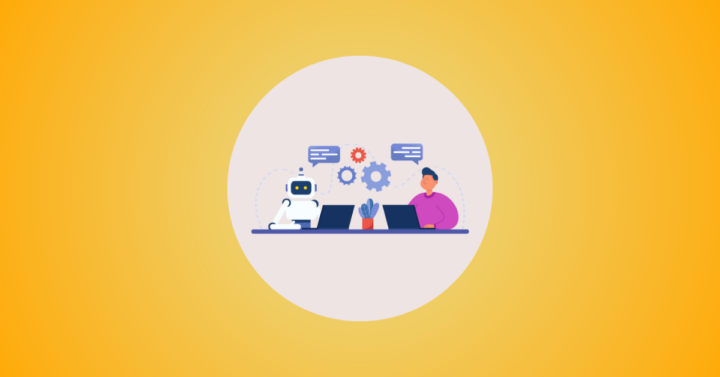
Mike, a marketing manager at a growing D2C ecommerce brand, was drowning in tasks – personalizing email campaigns, optimizing ad bids, and responding to customer inquiries.
Despite using multiple tools, he struggled to keep up with real-time engagement and data-driven decision-making.
That’s when he discovered AI agents.
Unlike traditional automation, AI agents didn’t just follow rules; they learned, adapted, and made decisions.
Mike’s campaigns became more targeted, customer interactions more personalized, and overall efficiency skyrocketed.
His brand saw higher engagement rates, improved ROI, and a noticeable reduction in manual workload.
AI agents are transforming digital marketing by automating complex processes, enhancing personalization, and optimizing campaigns in real-time.
For marketers, agency owners, and SMEs, integrating AI agents isn’t just an option – it’s the key to staying ahead in the competitive digital landscape.
What is an AI Agent: From a Marketer’s Perspective
An AI agent is a software system that autonomously performs marketing-related tasks by analyzing data, learning from interactions, and making real-time decisions.
Unlike simple automation tools, AI agents adapt to changing conditions and optimize outcomes based on their learning.
The diagram shown below visualizes how an AI agent functions within a marketer’s ecosystem to streamline tasks, enhance decision-making, and drive productivity.
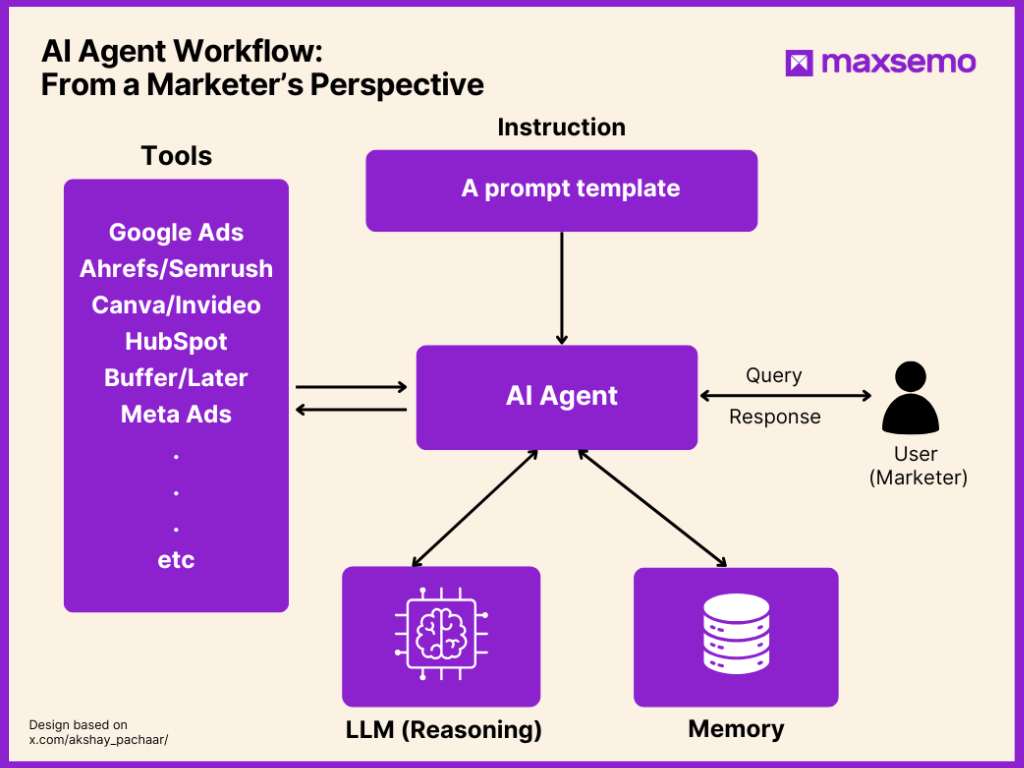
Instruction (Prompt Template): The process begins when a marketer (user) provides an instruction – often through a pre-defined prompt template.
This template structures the marketer’s query or goal, such as “Generate an ad copy for a new product” or “Create a content calendar for Linkedin.”
AI Agent as the Central Brain: At the core of the workflow is the AI agent, which acts as an intelligent orchestrator. It interprets the instruction and decides how to process it.
The agent doesn’t work alone – it leverages several powerful resources to complete its task efficiently.
LLM (Reasoning): The AI agent relies on a Large Language Model (LLM) to process complex instructions, perform reasoning, and generate human-like outputs.
Whether it’s crafting personalized emails or summarizing competitor research, the LLM is responsible for the “thinking” part.
Memory Component: The memory allows the AI agent to retain context from past interactions – be it campaign history, brand messaging tone preferences, or customer insights.
This ensures continuity and personalization in responses over time.
Integration with Tools: The AI agent connects with a variety of marketing tools such as:
- Google Ads or Meta Ads for ad campaign creation and optimization
- Ahrefs/Semrush for SEO analysis and keyword research
- Canva/InVideo for quick content creation
- HubSpot for CRM or email automation
- Buffer/Later for social media scheduling and analytics, and so on.
These integrations allow the AI agent to execute real-world marketing tasks autonomously or semi-autonomously.
Query & Response Cycle with the Marketer: Finally, the agent communicates back with the marketer (or user) – returning actionable insights, creative drafts, or recommendations. The marketer can iterate, fine-tune, or automate follow-up actions based on these responses.
According to Salesforce, leveraging or implementing AI is the number one priority for marketers and majority of them are either experimenting with or have fully implemented AI in their work.
How an AI Agent is Different from Chatbots and RPA
Below table shows how an AI agent is different from a chatbot and RPA bot, all from a marketer’s perspective.
| Feature | AI Agent | Chatbots | RPA (Robotic Process Automation) |
| Definition | Self-learning software that continuously improves marketing campaigns. | Conversational tools that engage with users based on predefined scripts or AI models. | Rule-based automation that performs repetitive, structured tasks. |
| Example | An AI-powered email assistant that personalizes campaigns based on customer interactions. | A chatbot answering FAQs on a website. | An RPA bot scheduling social media posts at predefined times. |
| Learning Ability | Continuously learns and adapts from new data and interactions. | Limited learning based on predefined models (unless AI-powered). | No learning ability, only follows set rules. |
| Decision-Making | Makes real-time decisions based on predictive analytics. | Follows scripted or AI-driven responses. | Executes pre-programmed tasks without decision-making. |
How AI Agents Help with Your Marketing Campaigns?
AI agents are revolutionizing digital marketing landscape by providing your business with real-time optimization, automation, and deeper insights.
Here are few ways they can supercharge your marketing campaigns:
- AI agents analyze customer data and behavioral patterns to deliver personalized content, emails, and ad recommendations. 51% of marketers (based in the US) use AI tools for data processing.
- They can generate high-quality website content, social media updates, and email content tailored to audience preferences. According to SurveyMonkey, 50% of surveyed marketers say that they use AI to create content and another 45% of marketers use AI to brainstorm content ideas.
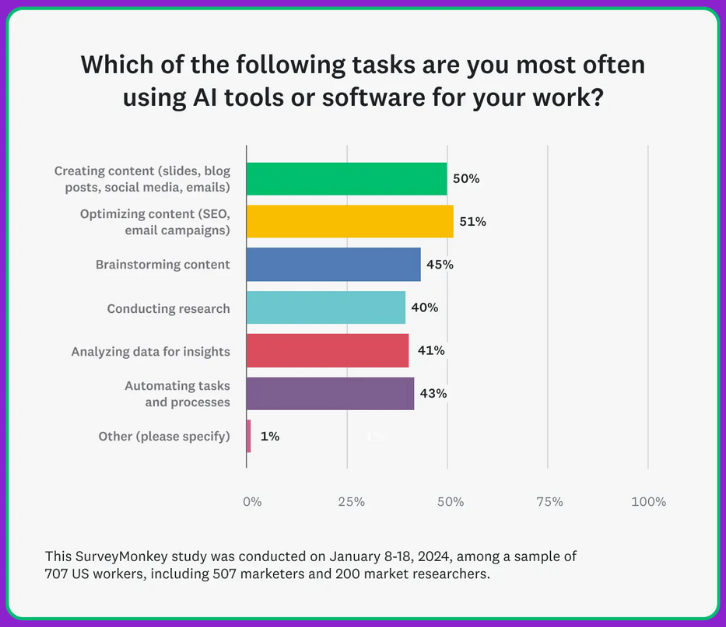
- AI agents can adjust ad bids, target audiences, and optimize placements based on past performance metrics. They continuously learn from engagement data to improve your ROI and reduce wasted ad spend. According to Adobe’s survey, 46% of marketers already use it for ad targeting and optimization.
- They can manage customer interactions via social media, email, and chat. They respond instantly, qualify leads, and nurture prospects with relevant information, improving conversion rates. Even 73% of marketers say that AI plays a role in personalized customer experiences.
- AI monitors brand mentions, analyzes customer sentiment, and identifies engagement opportunities. It helps businesses proactively respond to customers and fulfil their needs. 54% of customers aren’t bothered how they interact with a company as long as their problems are fixed fast.
- An AI agent can detect fraudulent activities such as fake clicks on ads, social media bots, etc thereby safeguarding your marketing investments.
When You Need AI Agents for Your Digital Marketing Efforts?
The need for using AI agents in your digital marketing efforts come up when you face any of the following challenges:
- Struggling with managing high volumes of customer interactions efficiently.
- When personalization (in ads, content, and email) at scale becomes challenging.
- When your campaigns need real-time adjustments based on customer behaviour and trends.
- Require predictive analytics to make data-driven marketing decisions.
- Proactive handling of social media monitoring and sentiment analysis.
- Struggling with fraud detection in paid ads and campaign analytics.
- More dynamic, data-driven A/B testing and campaign optimization.
- Require automation for lead qualification and nurturing to improve conversion rates.
- Repetitive marketing tasks make it difficult to free up resources for strategic activities.
Which Industries Can Use AI Agents in Their Digital Marketing Efforts?
AI agents are transforming digital marketing by streamlining operations, optimizing campaigns, and delivering hyper-personalized experiences.
Here are few industries that can significantly benefit:
E-commerce
AI agents enhance product recommendations, personalize marketing emails, optimize pricing strategies, and automate customer support for better conversions and retention.
For example, an AI agent on an online fashion store analyzes an account user’s browsing history and purchase patterns to send personalized discount offers and product recommendations via email and push notifications.
Healthcare
AI-powered chatbots provide instant responses to patient inquiries, predictive analytics improve campaign targeting, and AI-generated content helps educate audiences effectively.
A telemedicine platform uses AI to segment audiences based on medical history and send targeted content about relevant health checkups and treatments via automated email campaigns.
Real Estate
AI agents assist with lead scoring, automate follow-ups, optimize ad placements, and personalize property recommendations based on user preferences.
A real estate firm integrates an AI chatbot on its website that asks users about their budget, location preference, and property type, then recommends suitable listings in real-time.
Financial Services
AI improves fraud detection in marketing campaigns, personalizes financial product recommendations, and automates client engagement through AI-powered assistants.
A banking app uses AI to analyze transaction data and recommend relevant credit/debit card offers, personal loans, or investment plans to users based on their spending habits.
Education & EdTech
AI-powered chatbots and content generators enhance student engagement, personalize course recommendations, and automate email marketing for higher enrollments.
An online learning platform uses AI to track a student’s progress and automatically suggest additional courses, personalized learning paths, and interactive quizzes to improve retention.
Home Services
AI agents can personalize recommendations for users searching for plumbers, electricians, or cleaners, optimize local SEO strategies, automate appointment booking, and improve engagement with AI-powered customer support.
For example, a home services platform leverages an AI agent to analyze user search intent, match homeowners with the most relevant local service providers, and personalize follow-up communication based on previous interactions.
Supply Chain & Logistics
AI agents analyze customer demand, personalize B2B marketing emails, automate PPC ad bidding based on seasonal trends, and enhance customer engagement through AI-driven chatbots.
A supply chain SaaS platform can use AI agents to analyze shipping patterns, segment customers based on logistics needs, and send personalized marketing content to importers/exporters, improving engagement and lead conversion.
How to Build an AI Agent for Your Digital Marketing Campaign?
Building an AI agent for your marketing efforts doesn’t always require deep technical expertise – especially with the rise of no-code and low-code tools.
Here’s how you can get started:
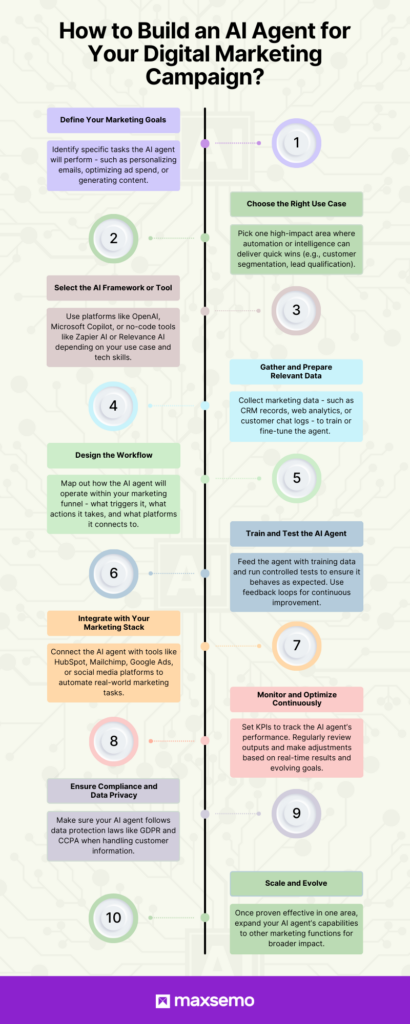
Tools to Create AI Agents for Your Digital Marketing Needs
You don’t need to be a developer to start building AI agents for your marketing campaigns. Find the right platform that suits your marketing needs and include it in your martech stack.
Here are five no-code platforms that let you create, deploy, and manage AI agents with ease:
Relevance AI
Relevance AI lets marketers build powerful no-code agents using drag-and-drop workflows.
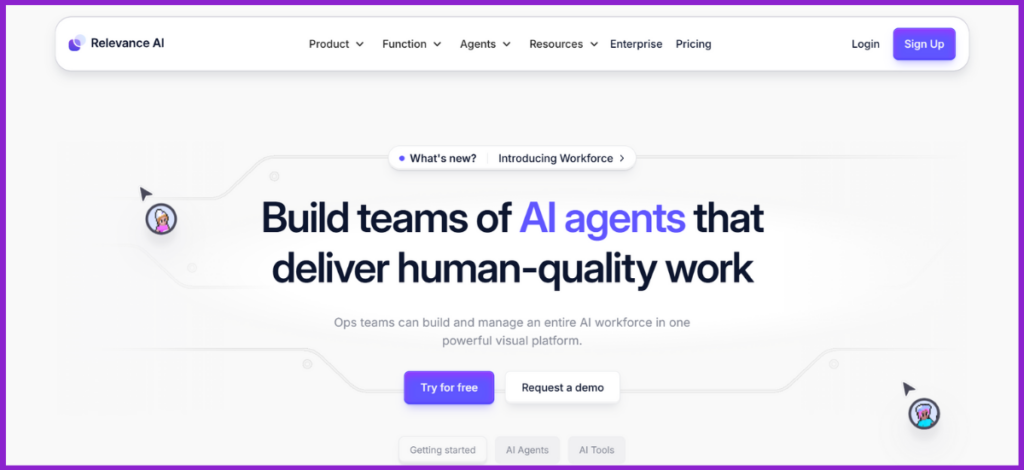
You can automate customer feedback analysis, content classification, and marketing reports – all from a visual dashboard. This platform offers a free plan which you can use to test the AI agent’s capability.
UiPath AI Agent Builder
UiPath’s Agent Builder enables marketers to create task-specific AI agents without coding.
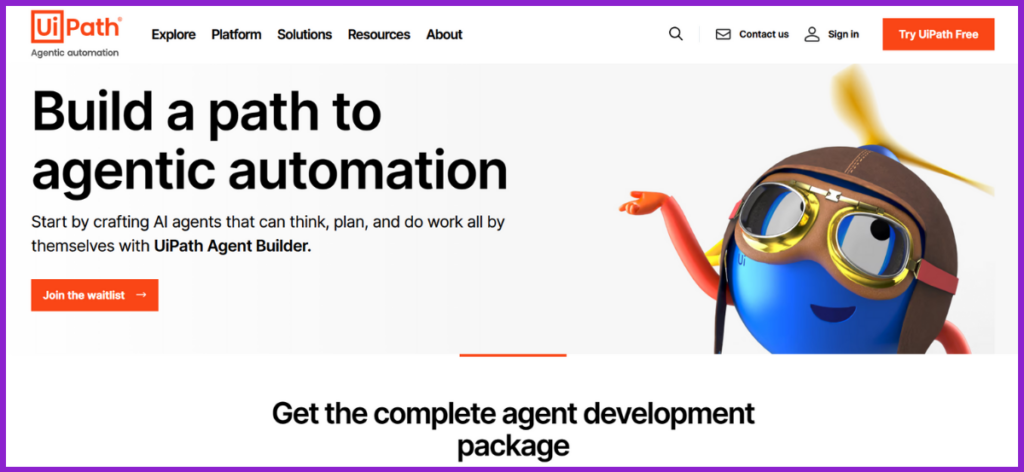
These agents can extract insights from campaign data, summarize marketing content, and assist in lead follow-ups using simple instructions and integrated automation.
Agentforce (by Salesforce)
Agentforce empowers businesses to create trusted AI agents directly within the Salesforce ecosystem.
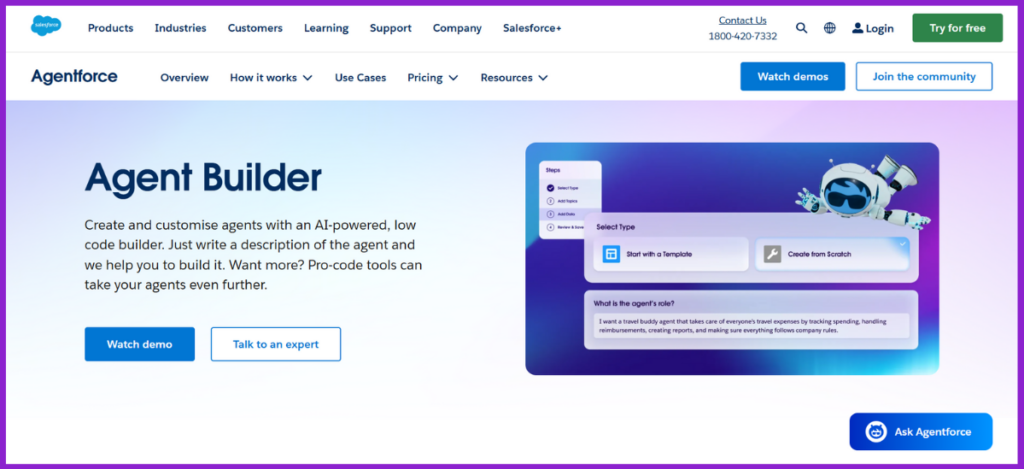
Marketers can build no-code agents that automate lead nurturing, generate content, analyze CRM data, and offer real-time campaign insights – all while maintaining brand and data integrity.
Zapier AI
Zapier’s AI Agents enable marketers to create AI-powered teammates that automate tasks across over 7000+ apps without coding.
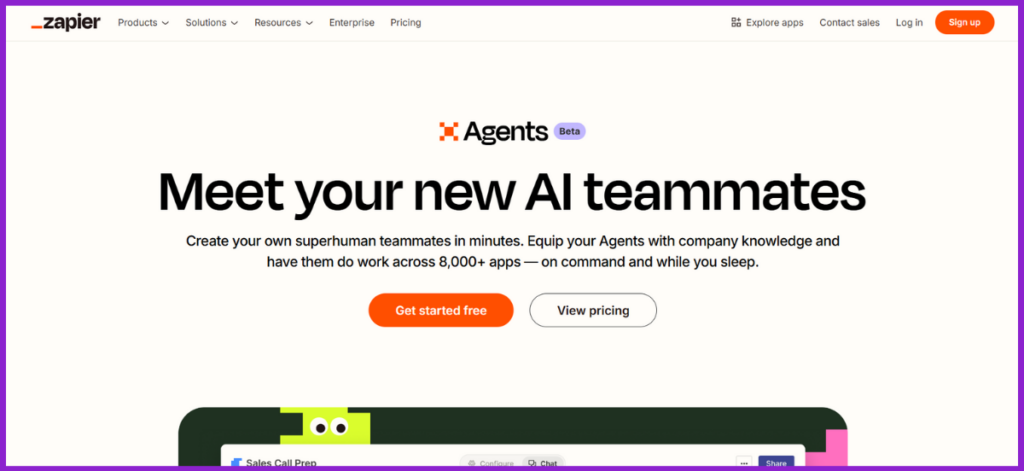
These agents can process leads, manage emails, and handle calendar events by accessing live business data to deliver accurate, up-to-date responses.
Users can build custom agents in minutes using plain English, allowing for seamless integration into existing workflows. You can start building one using their free plan.
Vertex AI Agent Builder
Vertex AI Agent Builder from Google is a powerful no-code platform that enables marketers to create and deploy AI agents using natural language prompts.
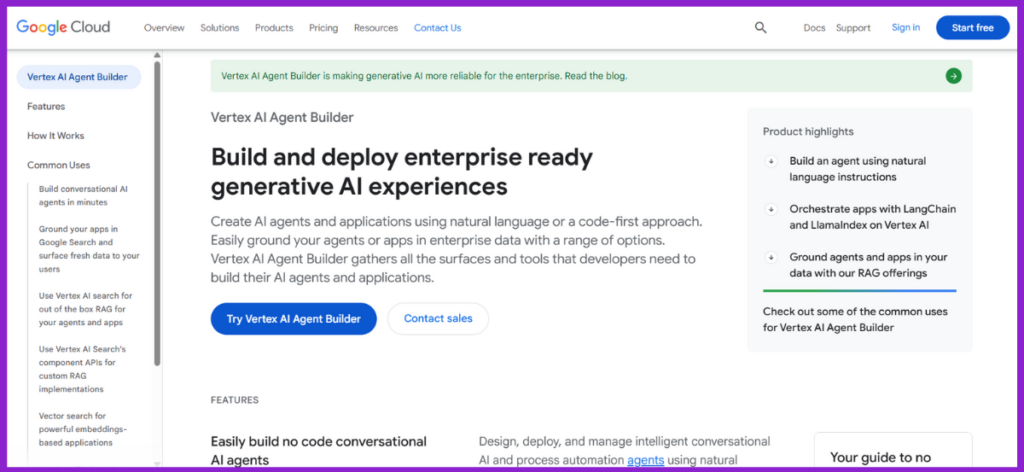
It integrates seamlessly with other Google Cloud services and allows for building virtual agents that can understand user intent, fetch data, and automate marketing tasks across channels.
With built-in support for generative AI and easy integrations, it’s ideal for creating scalable, intelligent marketing workflows.
Final Thoughts
AI agents are revolutionizing digital marketing with automation, personalization, and real-time optimization.
But like any technology, they come with challenges – data privacy concerns, potential biases, and the need for continuous monitoring.
You should start small, test thoroughly, and always keep human oversight in the loop to ensure ethical and effective use.
What to explore marketing strategies or tactics for your business? Check out our blogs.
Need expert advice? Contact me to level up your marketing with smart solutions.
